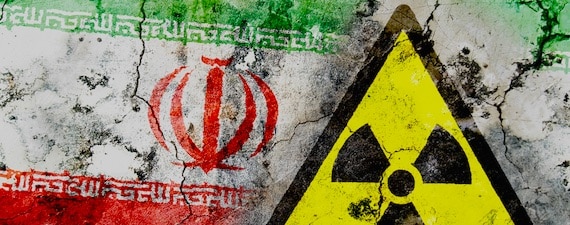Iran’s Faux Multiple Personality Disorder
Why are seemingly sensible people cheering the Iran deal, given the regime’s notorious brutality and belligerence? The answer lies in a wonkish affliction that you could call the split-personality fallacy.
Glance at the regime we’re talking about. Iran is a horrific theocracy that methodically violates individual rights. Iran’s worldwide backing of jihadists last year (according to our own government) was “undiminished.” Across the Middle East, Iran vigorously seeks dominion: in Beirut, Damascus, Sanaa, Baghdad, and Gaza, it already exerts significant influence, and it has begun outreach to the Taliban.
Post-deal, might the mass chants in Iran of “death to America” end? Might the regime’s hostility toward us (“the Great Satan”) abate? Whoever cherishes such hopes had them slapped down by Iran’s “supreme leader” Ayatollah Khamenei: Our policy toward the “arrogant” U.S. government, he announced after the deal, “won’t change at all.”
Yet in a major speech last week at American University, President Obama noted the deal’s many backers: “The United Nations Security Council has unanimously supported it. The majority of arms control and non-proliferation experts support it. Over 100 former ambassadors — who served under Republican and Democratic Presidents — support it.”
To that tally, add two scholars from the self-described libertarian Cato Institute, who also praised it. They argued the “agreement must be viewed as a clear success.”
The Split Personality Fallacy
How could anyone think that it’s a good idea to negotiate with an openly hostile regime that fuels jihadists and seeks our destruction? Enter the split-personality fallacy. The crux of this fallacy is to treat the actions of Iran (or another tyranny we want to engage diplomatically) in isolation, as if carried out by distinct, firewalled personalities that happen to coexist in the same physical regime.
Iran’s drive for nuclear capability (officially: for civilian purposes!) reflects one personality. Iran’s pervasive violation of individual rights domestically? That’s another. How about its ongoing backing of jihadist groups? Still another. What about Iran’s quest for regional domination? Yet another, dissociated personality.
The logic of this fractured perspective means that we must handle each personality separately, divorced from any wider context. Thus, many boosters of the Iran deal bless it on the minutely narrow grounds that it might delay Iran’s nuclear program. Everything else — domestic repression, the drive for regional conquest, backing jihadists, hostility toward us — is beyond the deal’s scope, and therefore not something we should consider in judging the deal and consequences.
Projecting Our Disorder Onto Iran
Segmenting Iran’s nuclear program for piecemeal attention is touted as reflecting a nuanced, hard-headed concern with practicality. But what actually underlies the fractured, ultra-narrow approach toward Iran is a desire to evade the regime’s animating ideological character. Observe how we have no concern about nuclear weapons in the hands of the United Kingdom or France; but precisely the same weapon in Iran’s hands is a grave concern, because of its militant character. Push that out of mind, though, and you can dream up a dealable-with persona, one which (like the UK or France) might actually comply with a pact.
But ignoring Iran’s character is policy malpractice. To assess the situation rationally and formulate sound policy, it is crucial that we have a clear understanding of the regime’s character. Is it a good idea to negotiate with Iran? Is the nuclear deal signed in Vienna a “clear success”? When you look at the contours of Iran’s nature, you see the answers are: no, and no.
The Iranian regime embodies the idea of Islamic totalitarianism. Its founder and first “supreme leader,” Ayatollah Khomeini, brought into reality a theory of clerical rule. Tehran demands from its citizens submission to religious law. Ergo the “morality police” that patrol the streets and harass women for wearing the wrong kind of veil.
Stop Ignoring Iran’s Totalitarian Nature
At the core is the totalitarian ambition to subjugate people. Witness the fate of six Iranian twenty-somethings who videoed themselves singing along to Pharrell’s “Happy.” Their video went viral. Then they were arrested, tried, and found guilty of “participation in the making of a vulgar clip” and “illegitimate relations between members of the group.”
They may yet escape being flogged or doing jail time (their sentence), but the fact that they were swept up for something so benign perfectly illustrates Tehran’s rule by intimidation. Insulting the theocratic government and “blasphemy” are crimes. Hashem Shaabani, a poet, was accused of criticizing the regime. An executioner’s noose wrung the life out of him. To the Iranian regime, human life is cheap.
This same totalitarian lust for domestic subjugation animates Tehran’s aggression beyond its borders. Iran’s founding constitution states that its army and the Revolutionary Guards Corps
will be responsible not only for guarding and preserving the frontiers of the country, but also for fulfilling the ideological mission of jihad in God’s way; that is, extending the sovereignty of God’s law throughout the world (this is in accordance with the Koranic verse ‘Prepare against them whatever force you are able to muster, and strings of horses, striking fear into the enemy of God and your enemy, and others besides them’ [8:60]).
Iran has made good on that mission by helping build and train jihadist groups. Its main proxy force is Hezbollah (“the army of God”). It has carried out attacks from Beirut to Buenos Aries, and it has slaughtered American soldiers and diplomats in Lebanon and in Iraq. Despite being subjected to years of supposedly biting economic sanctions, Iran funneled billions of dollars to support the Assad regime in Syria and to provision Hamas, in the Gaza strip, with weapons and rockets.
Iran Doesn’t Have Split Personality Disorder
But suppose we took the facts of Iran’s character seriously. We would be able to formulate a rational approach toward that regime. Here are two key takeaways that ought to shape it.
First, Iran’s domestic repression and its imperialist march and its nuclear aspiration are inseparable. They stem from the same causal factor, the regime’s declared ideological mission. If Allah’s word is the truth (and Iran’s leaders definitely think so), then all mankind must be brought under its purview. How can there be any limits to where the truth must reign? (Tehran certainly sees no such limits.) How can any means to advance that grandiose vision be precluded? (For Iran, none should be.) Going nuclear would provide Iran with a new means to advance the goal of expanding Allah’s dominion.
Second, diplomatic engagement with Iran over the nuclear issue is a disaster in the making. Quite apart from the material “carrots” Iran might pocket and use to fund its jihadist proxies, simply allowing it to pull up a seat at the negotiating table is to confer on the regime an undeserved legitimacy. It implies that Iran, despite all the blood on its hands, is somehow a peace-seeking state; that despite its manifest belligerence, Iran is somehow committed to persuasion. Recall that Iran has engaged in deception at every step. Here we’re providing that tyranny with moral cover. Far from putting distance between Iran and the bomb, all this appeasing deal can do is encourage the regime in its malignant campaign.
The split-personality fallacy sabotages policy thinking. Fracturing Iran’s character into dissociated shards will not make Iran’s character something other than what it clearly is. Blinding ourselves to it just puts great distance between us and the crucial facts needed to resolve the situation.
And the nuclear deal promises to land us in graver problems down the road. It strengthens Iran, bringing the regime ever closer to going nuclear. By allowing that to happen, we will multiply the difficulty of using military force to defend ourselves from the Iranian menace. The reality we face is unpleasant and deeply distressing, but ignoring the truth can only subvert our security.











